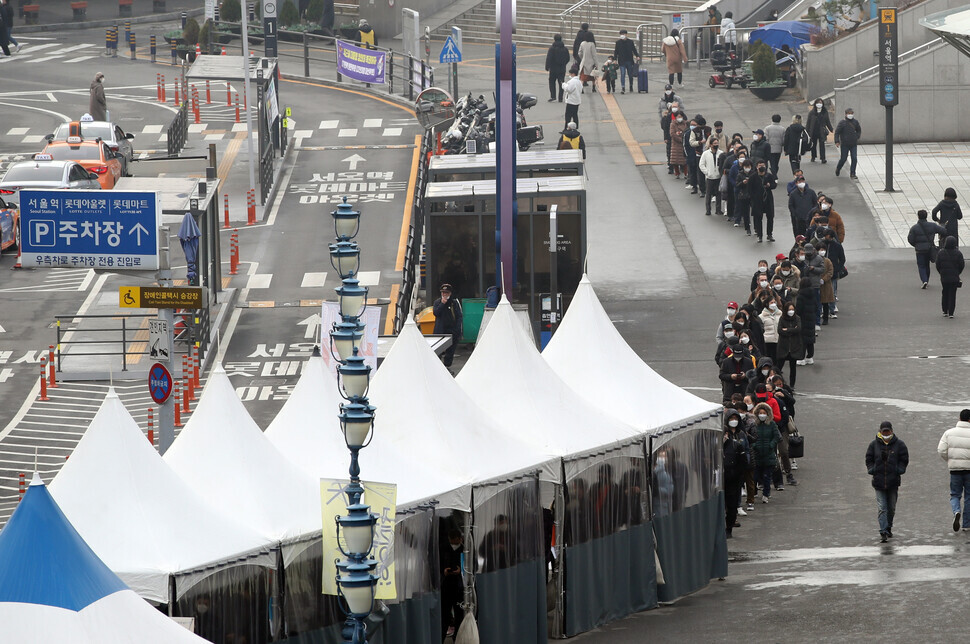hankyoreh
Links to other country sites 다른 나라 사이트 링크
[Column] Why Korea’s COVID-19 response is faltering


Korea is floundering in its battle against COVID-19.
At one point, Korea held a triple crown of sorts in the pandemic. It was one of the countries with the fewest cumulative cases and deaths per capita, was the advanced country with the least damage to its economic growth, and had the least severe restrictions and the shortest lockdowns.
Only a handful of countries in the world had managed to balance public health, economic growth and individual freedoms as well as Korea. That was a source of pride for the public.
But we’re confronted with evidence that the Korean approach to the pandemic no longer works. Korea is approaching 10,000 new cases of COVID-19 a day, its hospitals and contact tracers are overworked, and people are dying as they wait for hospital beds to open up.
Experts warn that the situation may spin out of control and are calling for emergency measures. In contrast, the typical phenomena that have led to disaster in Western countries — urban legends about vaccines, fake news, conspiracy theories and the politicization of COVID-19 — are finally sprouting in Korea as well.
How exactly did South Korea get here? While there are several factors related to public health and medical care, the political factor is especially salient.
Korea’s handling of the pandemic has had two strengths and two weaknesses. The strengths are the government’s swift decisions and implementation of those decisions and the public’s voluntary self-regulation. By contrast, the weaknesses are Korea’s poor social safety net and the lack of government-provided medical care. What's key is how the calculus of strengths and weaknesses has changed.
The Korean government’s response to COVID-19 was characterized not by its intensity but by its timing and by the government’s powers of implementation.
According to a study by the Blavatnik School of Government at Oxford University, the Korean government took quick action before the disease began to spread and then eased its measures when the spread was curtailed. In contrast, many Western countries such as the US and the UK didn’t respond firmly until the disease was already spreading, which entailed much tougher lockdowns.
But even more critical to Korea’s success than the government’s response was Koreans’ own self-regulation. Koreans were neither afraid of punishment nor subservient to the government — they were proactive in their response.
According to an analysis by Kim Jung, a professor at the University of North Korean Studies, Koreans reduced their movement once the infection began to spread and, as an extension of that, continued to exhibit a pattern of cooperation with government regulations.
But the situation has changed.
The recent surge in cases began with the government’s policy of “living with COVID-19.” That undermined one of the pillars of the pandemic response. In many countries, the hurried adoption of such a policy touched off huge waves of infection that prompted tougher lockdowns and wreaked even worse damage to their economies.
Why, then, did the Korean government hasten to make that same decision? I think it was rooted in the limits of the government’s fiscal ability and programs for guaranteeing the income of the groups who lost the most from COVID-19 restrictions. That is, the weaknesses of Korea’s pandemic response overpowered its strengths.
Koreans’ self-regulation began to weaken as well. The problem was not some vague psychological factor, such as pandemic fatigue, but rather the concrete variable of diminishing trust in the president and his party.
According to a recent analysis by Oh Hyun-jin, a researcher at the Institute of Governmental Studies at Korea University, the tendency to support the president and political parties has a very large impact on trust in vaccines and the government’s COVID-19 policy. As public support has grown for bringing a new party to power, there has also been greater resistance to vaccination and social distancing.
As the two strengths of Korea’s pandemic response atrophied, the number of new cases surged. But the ultimate reason that this led to a shortage of hospital beds, overwork for medical staff, and limitations on assistance for at-home treatment was the lack of government-run medical services, the second weakness of Korea’s pandemic response.
The shortcomings of Korea’s pandemic response are now plain to see. The question then becomes what course should we take to tackle those issues?
The most urgent matter is taking action to enable Koreans to overcome their political differences and trust the government and the president when it comes to the national mission of responding to COVID-19. Unless mistrust is addressed, the “shield of the citizens” that has been a pillar of Korea’s pandemic response cannot be made strong again no matter what government agencies such as the Central Disaster and Safety Countermeasure Headquarters or the Korea Disease Control and Prevention Agency do to persuade the public.
Public trust is more essential than external regulations such as a vaccine pass. Restoring it is the task of political leaders such as the president and prime minister.
Second, it has become clear that the three Ts — track, test and treat — aren’t enough to make the “shield of the state,” the other pillar of Korea’s pandemic response, sustainable. We are realizing that reasonable disease control measures are impossible without a basic income guarantee and that it’s difficult to respond to disasters without expanding government-run medical services.
The only way we can maintain a normally functioning society in the face of the infectious disease crises that will recur in the future is by enacting universal social security and expanding the nonprofit public sector. What’s needed is the political drive for those reforms.
Please direct questions or comments to [english@hani.co.kr]

Editorial・opinion
![[Column] When ‘fairness’ means hate and violence [Column] When ‘fairness’ means hate and violence](https://flexible.img.hani.co.kr/flexible/normal/500/300/imgdb/original/2024/0516/7417158465908824.jpg) [Column] When ‘fairness’ means hate and violence
[Column] When ‘fairness’ means hate and violence![[Editorial] Yoon must stop abusing authority to shield himself from investigation [Editorial] Yoon must stop abusing authority to shield himself from investigation](https://flexible.img.hani.co.kr/flexible/normal/500/300/imgdb/original/2024/0516/4417158464854198.jpg) [Editorial] Yoon must stop abusing authority to shield himself from investigation
[Editorial] Yoon must stop abusing authority to shield himself from investigation- [Column] US troop withdrawal from Korea could be the Acheson Line all over
- [Column] How to win back readers who’ve turned to YouTube for news
- [Column] Welcome to the president’s pity party
- [Editorial] Korea must respond firmly to Japan’s attempt to usurp Line
- [Editorial] Transfers of prosecutors investigating Korea’s first lady send chilling message
- [Column] Will Seoul’s ties with Moscow really recover on their own?
- [Column] Samsung’s ‘lost decade’ and Lee Jae-yong’s mismatched chopsticks
- [Correspondent’s column] The real reason the US is worried about Chinese ‘overcapacity’
Most viewed articles
- 1China calls US tariffs ‘madness,’ warns of full-on trade conflict
- 2[Editorial] Yoon must stop abusing authority to shield himself from investigation
- 3[Column] When ‘fairness’ means hate and violence
- 4[Column] US troop withdrawal from Korea could be the Acheson Line all over
- 5[Column] How to win back readers who’ve turned to YouTube for news
- 6[Book review] Who said Asians can’t make some good trouble?
- 7US has always pulled troops from Korea unilaterally — is Yoon prepared for it to happen again?
- 8Naver’s union calls for action from government over possible Japanese buyout of Line
- 9Could Korea’s Naver lose control of Line to Japan?
- 10DongA Ilbo and the government are told to apologize for past civil rights violations